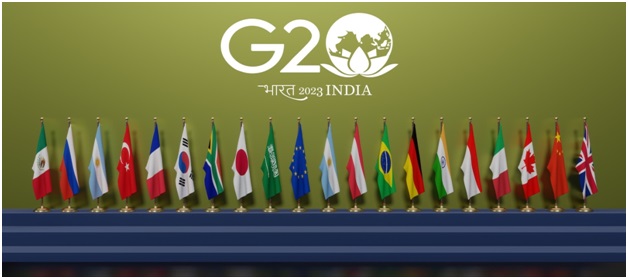At G20, the Eend of Old Multilateralism – and the Beginning of a New Order (Indian Express)

- 07 Sep 2023
Why in the News?
Delhi’s current emphasis is on building bridges between developing and developed countries. Many in the developed world are waking up to the importance of greater cooperation between the North and the South amidst the breakdown of relations between the East and the West.
What are the factors contributing to the weakening of global cooperation in the post-Cold War era?
- Russian Conflicts: International relations have been strained due to Russia's aggressive actions, notably its annexation of Ukraine's Crimean Peninsula in 2014 and the ongoing conflict with Ukraine.
- China's Territorial Ambitions: Concerns have arisen from China's territorial disputes with neighboring Asian countries, including India, Japan, the Philippines, and Vietnam.
- Economic Leverage: China's attempts to leverage its economic power for political and strategic purposes have led to growing distrust among nations worldwide.
- Change in Chinese Policies: A shift in Chinese policies under Xi Jinping, departing from the peaceful periphery and shared prosperity approach of the 1980s, has had adverse effects on regional and global institutions.
How is Asia reacting to China's actions?
- Security Institutions: New security coalitions such as the Quad, comprising India, the United States, Japan, and Australia, have been formed to counterbalance China's growing influence in the region.
- AUKUS Pact: The establishment of the AUKUS alliance, which includes Australia, Britain, and the United States, is a direct response to China's expanding military presence in the area.
- Questioning ASEAN's Role: China's assertive territorial expansion has raised concerns about the effectiveness of ASEAN-led regional organizations in maintaining stability.
- Bilateral Relationships: Many Asian nations are reinforcing bilateral ties to deter China's unilateral actions. For instance, the trilateral agreement involving the United States, Japan, and South Korea aims to enhance security in Northeast Asia.
- Economic Diversification: Countries like Japan and the United States are actively seeking to reduce their economic reliance on China by diversifying their trade partnerships.
How is India's role undergoing transformation?
- Central Player: India is increasingly assuming a central role in shaping both regional and global dynamics, evident in its active participation in forums such as the Indo-Pacific Quadrilateral Forum.
- G20's Evolution: India is advocating for the G20 to address the concerns of the Global South, indicating its aspiration to have a more significant role in global economic discussions.
- Shifting Alliances: While historically aligned with Moscow and Beijing for a multipolar world, India's focus has shifted due to China's growing assertiveness, leading it closer to nations like Australia, Japan, and the United States.
- Embracing the Indo-Pacific: India has embraced the Indo-Pacific concept and revitalized the Quad alliance to counterbalance China's influence in the region.
What are the key elements of India's new approach to multilateralism?
- Quad Collaboration: During the Jakarta summit, the Prime Minister of India emphasized the Quad's role in complementing ASEAN's efforts and promoting regional stability.
- Re-globalization Focus: India's External Affairs Minister, S Jaishankar, advocates for a diversified and democratic form of globalization that moves away from a production model centered around China.
- Collective Solutions: Despite the challenges faced in multilateralism, India remains committed to seeking collective solutions to various global issues, including the modernization of the global tax regime.
Global South Concerns: India places a strong emphasis on addressing the concerns of the Global South within the G-20 agenda, with a goal of fostering greater cooperation between developed and developing nations, rather than reviving past confrontational politics.
